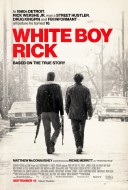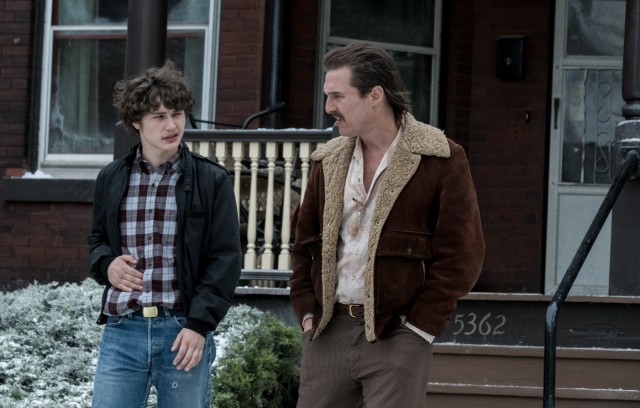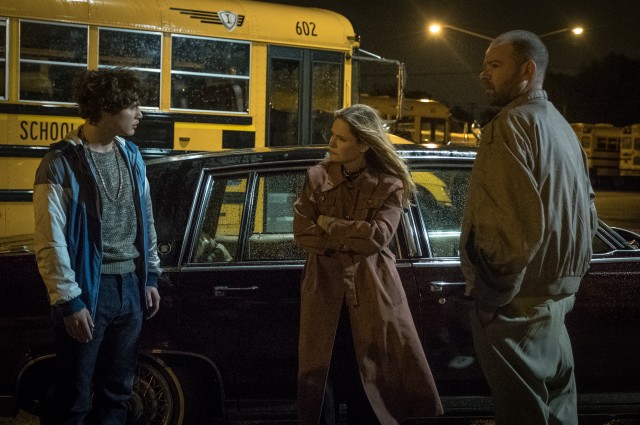White Boy Rick Movie Review
 |
White Boy Rick
Theatrical Release: September 14, 2018 / Running Time: 110 Minutes / Rating: R Director: Yann DeMange / Writers: Andy Weiss, Logan Miller, Noah Miller Cast: Matthew McConaughey (Richard Wershe Sr.), Richie Merritt (Rick "White Boy Rick" Wershe Jr.), Bel Powley (Dawn Wershe), Jennifer Jason Leigh (FBI Agent Snyder), Brian Tyree Henry (Detective Jackson), Rory Cochrane (FBI Agent Byrd), RJ Cyler (Rudell "Boo" Curry), Jonathan Majors (Johnny "Lil Man" Curry), Eddie Marsan (Art Derrick), Bruce Dern (Grandpa Roman "Ray" Wershe), Piper Laurie (Grandma Verna Wershe) |
White Boy Rick tells the true story of Richard Wershe Jr. The film opens in 1984, when Rick (newcomer Richie Merritt) is a 14-year-old Detroit boy living in a neighborhood full of poverty, crime, and drugs. Those two agents (Jennifer Jason Leigh and Rory Cochrane) as well as a local narcotics detective (Brian Tyree Henry) approach the teenaged Rick and ask him to work with them. With these authorities bankrolling him, Rick is to buy drugs and make connections within these illicit worlds. Having already endeared himself to some fairly prominent gangsters, "White Boy Rick" does as he is told, gathering intelligence and buying and selling crack cocaine as needed.
It's a lucrative yet dangerous life for the teen, whose peach fuzz mustache serves as a constant reminder of his youth. As his dad struggles to make ends meet, relying heavily on the generosity of his own parents (repeat Academy Award nominees Bruce Dern and Piper Laurie), Rick's older sister Dawn (Bel Powley) gets mixed up in drugs after she moves in with a boyfriend who doesn't seem to have her best interests at heart.
With authentic period detail and prominent tunes from its era, White Boy Rick will remind you of films like Goodfellas, Donnie Brasco, and Blow. But it's much less flashy than those true crime dramatizations and there's a lot less to chew on here.
In just his second feature in the director's chair, France's Yann Demange ('71) repeatedly turns our attentions to the sadness that pervades the Wershes' lives and is reflected in the seemingly perpetual winter the city endures. Both Ricks seem to lack joy and friends. There's a brief moment where Rick Jr. seems happy while rollerskating and Rick Sr., having made good on his video rental store dream, contentedly watches his daughter across the street. The rest of the time, whether they're making money (son) or not (father), the Wershe men strike you as unhappy and alone.
Written by Andy Weiss (picking up his first theatrical credit since 2010's Middle Men) and brothers Logan and Noah Miller (Sweetwater, Touching Home), the screenplay doesn't dish out a ton of narrative. Conflict is kept to a minimum and characters of note are few. There are two violent acts that take us by surprise, the bigger of which briefly changes the movie. But the film never seems to understand what motivates its young protagonist or why we should root for him to succeed other than the fact that he's been dealt a bad hand.
Merritt bears significant resemblance to the actual teenaged Wershe, but his characterization is not one that can carry the film like it is meant to. McConaughey picks up the slack, arresting with his own fully mustachioed acting. But the film's big knockout blow comes in closing screen text that laments the fate of the real Wershe, Yes, White Boy Rick is a fall movie, one that would look out of place going to theaters any other time of the year. But it's not an awards contender and it's certainly not a great film. That it is able to hold your attention as well as it does when reflection raises questions over why is a significant feat, but that only takes this to semi-satisfying heights.
|
Related Reviews:
DVDizzy.com | DVD and Blu-ray Reviews | New and Upcoming DVD & Blu-ray Schedule | Upcoming Cover Art | Search This Site
DVDizzy.com Top Stories:
Now in Theaters: The Predator • BlacKkKlansman • Searching • Kin • The Nun
Written by Andy Weiss: Middle Men | Written by Logan & Noah Miller: Sweetwater
Matthew McConaughey: Gold • The Wolf of Wall Street • Dallas Buyers Club • Interstellar
Bel Powley: The Diary of a Teenage Girl | Jennifer Jason Leigh: The Hateful Eight • Anomalisa • eXistenZ
Black Mass • Goodfellas • American Made • American Hustle • Killing Them Softly • The Iceman • Argo
Text copyright 2018 DVDizzy.com. Images copyright 2018 Columbia Pictures, Studio 8, LBI Entertainment, Le Grisbi, Protozoa.
Unauthorized reproduction prohibited.

